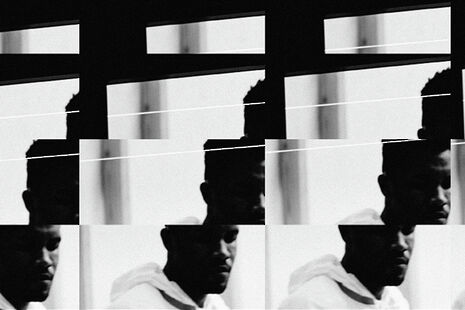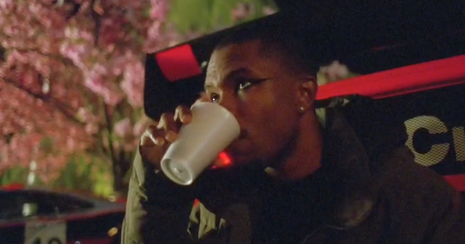Frank Ocean – Endless & Blonde
An astonishing comeback, which proves Ocean is one of pop’s brightest stars
Endless
Blonde

2016 has been one of the best years for music in recent memory, seeing massive releases from some of the biggest names in popular music. And now, after four years of waiting since his instant classic channel ORANGE, we have been gifted with not one but two new Frank Ocean albums.
In Ocean’s new so-called visual album Endless and album proper Blonde, the evasive singer-songwriter eschews the bombast of his peers’ recent projects (Kanye’s brilliantly scattershot The Life of Pablo; Drake’s rather bloated Views; Beyonce’s bold concept album Lemonade) and delivers a collection of abstract musical moments that give the listener a rare insight into the more vulnerable side of his psyche.
It is nigh on impossible to discuss this release without mentioning its rather pretentious release strategy. Between the name change à la Kanye/Drake from “Boys Don’t Cry”, the pop-up shops and magazine accompanying the album’s release, and teasing fans with a list of dates only to then suddenly drop both albums back to back, these two albums are possibly the most ‘2016’ albums to be released this year. And yet, as Blonde now finds itself atop the Billboard 200, these projects are far from what one would expect a number one album from a popular artist to be. Perhaps the most telling line comes on the Blonde closer, ‘Futura Free’: “I ain’t on your schedule. I ain’t on no schedule.”

It is rumoured that Endless was released first to meet Ocean’s contractual obligations to Def Jam records (amid speculation they have mistreated the artist). As a piece of black and white visual art, we effectively watch paint dry as Ocean builds a staircase.
Contemporary artist Tom Sachs, whose installation features in the video, explains that the piece is a symbol of the time it takes to create great art and a reaction to the homogenisation of our personalities in the digital age. Bookended by the robotic techno track ‘Device Control’, which speaks of: “Apple appliances” and “Sony telephones”, this makes sense, but it doesn’t stop the video itself from being extremely dull. The music, however, is a different beast altogether.
Both projects include quieter, sparser instrumentation than we’ve come to expect from Ocean, with largely beatless songs featuring long swathes of guitars and keyboards. Endless at times comes off like a collection of demos, with short ambient instrumentals interspersing the tracklist and an overall lo-fi quality to the album’s sound. But, make no mistake, this isn’t a throwaway album like Van Morrison’s infamous Bang Sessions, and there are still standout moments here.
His previously released cover of Aaliyah’s ‘At Your Best (You Are Love)’ has been updated, displaying one of his most breath-taking vocal performances with a goose-bump inducing falsetto. Elsewhere we hear Ocean in full oldie rap mode on ‘U-N-I-T-Y’ reminding us of his Odd Future days. The bouncy but criminally short ‘Comme Des Garçons’ breaks the subdued tone of the album.
And then there’s ‘Wither’, a track that surprisingly hasn’t received much critical spotlight considering that, in my opinion, it is the highlight of the album. Over gentle acoustic strumming, it’s the ache of Frank’s melisma that moves in a way that only the best vocalists can – think Stevie Wonder’s ‘Lately’ for the Tumblr generation. It’s transparent moments like this that display his magic, that really make you feel.
Still, it’s Blonde that is the real tour de force. Building upon Endless’ sparse sound, here he gives us a more concrete set of songs, nay, stories. Ocean has always been a superb storyteller, creating strong characters and synthesising the complexity of everyday situations masterfully. But on Blonde, the stories he delivers are more complex, at once both deeply personal to him and yet incredibly relatable to all. ‘Ivy’ is the closest thing to a perfect song that I can fathom, a haunting analysis of a failed relationship over dreamy guitar by bedroom indie artist Alex G. When he sings: “All the things I didn’t mean to say/didn’t mean to do” with his voice swelling to a dissonant scream, it resonates for anyone who has ever had their heart broken.

The album is peppered with references to drugs, be it: “tabs of that acid” on ‘Solo’ or “noses on a rail” on ‘Self Control’, painting a picture of escapism that many can identify with. And the skit ‘Facebook Story’, narrated by French producer SebastiAn, perfectly fits into the album’s narrative, with its exposure of the universal hypocrisies of the digital era through his own breakup tale.
Blonde is an artistic statement from a man nostalgic for his past, while slyly commenting on the culture that surrounds him. On the dizzying ‘Solo (Reprise)’, Ocean yields the lone guest spot to André 3000, who delivers an incredible verse, full of yearning for days gone by: “After 20 years in I’m so naïve”.
Opening statement ‘Nikes’ sees Frank manipulating his voice similarly to Kendrick Lamar – one of many ways this album could be seen as a kindred spirit to last year’s groundbreaking To Pimp A Butterfly. When he sings: “RIP Trayvon, that nigga look just like me”, a reference to the death of Trayvon Martin that was the catalyst for the ‘Black Lives Matter’ movement, one could easily interpret this as political commentary. But then you watch the accompanying music video, featuring glitter explosions and talking dogs and it becomes difficult to see.
No, Blonde is a black masterpiece in a different way. Through the ambiguity of the album’s title (Blonde on Apple Music but Blond on the cover), Ocean’s green (not blonde!) hair and the more experimental songwriting, Ocean sets himself apart as both a proud queer man in a world where terrorists attack nightclubs and as an artist that refuses to conform to the traditional notions of what a black, male R&B singer should be. “Shut the fuck up I don’t want your conversation”, he sings on the album’s centrepiece ‘Nights’. He is defiantly his own person and that we are to accept him on his terms.
It is in this regard that Ocean has proven himself to be one of the greatest stars of our generation; the next David Bowie, Prince or Michael Jackson, constantly evolving and unabashedly an artiste.
These two albums are difficult records and for non-Ocean acolytes, they perhaps aren’t the most accessible point of entry into his catalogue. But if you take the time to delve into the inner world that Ocean grants entry to, you will find a deeply rewarding collection of songs that invade your headspace more potently than any catchy radio earworm. It was worth the wait.
 News / Downing investigates ‘mysterious’ underground burial vault 29 December 2025
News / Downing investigates ‘mysterious’ underground burial vault 29 December 2025 Lifestyle / Ask Auntie Alice29 December 2025
Lifestyle / Ask Auntie Alice29 December 2025 News / Unions protest handling of redundancies at Epidemiology Unit30 December 2025
News / Unions protest handling of redundancies at Epidemiology Unit30 December 2025 Features / ‘Treated like we’re incompetent’: ents officers on college micromanagement30 December 2025
Features / ‘Treated like we’re incompetent’: ents officers on college micromanagement30 December 2025 Science / Astronomical events to look out for over the break29 December 2025
Science / Astronomical events to look out for over the break29 December 2025









